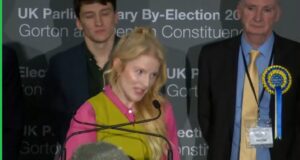THERESA MAY’S “cut and run” election has been exposed as a desperate gamble based on self-preservation rather than a move which can strengthen the UK’s hand in Brexit negotiations.
The Prime Minister had claimed she had decided to hold a General Election while she was on an Easter break – walking through the Welsh countryside. This never seemed plausible: you don’t decide something as huge as holding a General Election on a whim while you’re on your holidays. When she let everyone else in on the Election idea, May reasoned that a renewed mandate from the UK electorate would strengthen her hand when she negotiated with Brussels bureaucrats. This was even less credible: EU politicians and bureaucrats alike are going to be negotiating Brexit on the basis of what is best for the EU (including discouraging other states from going the same way). They are not going to be impressed by the size of the UK domestic mandate.
There are other, more plausible reasons, why May is calling a General Election. Primarily, it is not Brussels that is interested in the strength of Theresa May’s mandate as Theresa May is: she needs more Tory MPs.
May’s Government had a majority of around 12 (inherited from David Cameron’s General Election). If the eventual Brexit deal turned out not to be very favourable to the UK (and there are no signs that it will), she might not be able to secure parliamentary approval – if enough of her MPs threatened to vote against it.
The police are currently investigating election expenses issues which may lead to more than 12 Tory MPs having their elections voided and needing to be re-run. This could leave her without a majority for a couple of months – or even remove it altogther as the affected MPs represent marginal seats.
Despite occasional positive statistics, the economy is not doing well overall and is more likely to do worse, not better, with time. Public spending cuts will hit a wide range of people over the next couple of years. Given the opinion polls and the ongoing media attack on their opponents, it’s better for May to try to get a larger majority now and settle down to govern for the next five years – rather than wait to go to the country in three years’ time, when things could be a lost worse.
The EU has now exposed May’s bluster by agreeing – in one minute flat – negotiating guidelines for the Brexit discussions. The leaders of the EU member states have agreed the guidelines first put forward by European Council President Donald Tusk at the end of March, when Theresa May formally moved Article 50 to start the Brexit process.
The EU will begin talking to the UK after the General Election and the negotiations can go on until 29th March 2019 – although in practice it will be clear well before then whether agreement can be reached or whether the UK’s EU membership will end without agreement on the way forward.
The key issues for the EU are the rights of EU citizens who live in the UK and UK citizens who live within the EU; how the UK will pay up its outstanding financial obligations to the EU; and the new border between north and south Ireland – the only land border between the UK and EU.
The EU will also insist on making progress on these issues before beginning to explore the future relationship between the UK and EU. This is the opposite of what Theresa May had wanted – and the size of her electoral mandate is not going to help her here. The EU is ready for her – in a second case of “game on”.
[Adverts]
 East London News A Force for the community…
East London News A Force for the community…




